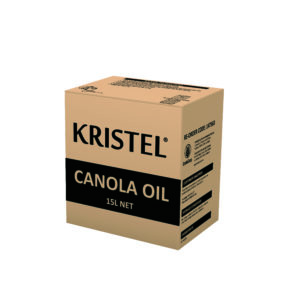With a long history in the local oilseed industry, we know the right individual or blended soft and hard oils to meet your precise needs. Our team of lipid specialists can also develop custom oil blends or tailored solutions with our sophisticated development and testing facility.
We have Halal, Kosher, non-GM and RSPO certified products available, all with an optimal frying life. Our products can be supplied in multiple sizes, and come in retail-ready packed, Pallecon or bulk.
Oil Information
Canola oil is considered one of the healthier edible vegetable oils in the world, thanks to lower contents of saturated fatty acid than most cooking oils, high levels of monosaturated fat and a balanced ratio of omega-6 and omega-3 polyunsaturated fatty acids.
Canola oil contains tocopherols (a natural antioxidant) and phytosterols (which contributes to cholesterol lowering properties).
This means you’re able to cut your cholesterol intake while enjoying a lighter texture and a more neutral taste than other oil blends.
Canola oil delivers great performance and has a high smoke point, making it desirable for use in high temperature cooking.
That means you can use it for just about any purpose – sautéing, stir-frying, deep-frying, baking, fondue… whatever your appetite demands.
High oleic canola oil has the same low level of saturated fats and positive health attributes as the classic canola oil has.
The difference is that the high oleic canola contains more monounsaturated fat (as oleic acid) and less polyunsaturated fat.
This unique fatty acid profile makes high oleic canola oil more stable, allowing for greater heat tolerance and longer shelf life.
As such, high-oleic canola oil is most used in commercial food production and food service.
Fun fact: According to the anola Council of Canada, canola oil be used to make environmentally friendly inks, lubricants, soaps, paints, plastics and cosmetics.
Soybean oil is extracted from the seeds of the soybean plant and is one of the most consumed cooking oils around the world.
Soybean oil is rich in polyunsaturated fats, particularly omega-6 linoleic acid (50 %) which renders it a ‘heart-healthy’ oil, as these fats are linked to lower cholesterol levels and a reduced risk of heart disease.
It is a versatile cooking oil that can be used for most cooking methods, including frying, baking and roasting.
Its neutral taste makes it an ideal substitute for other vegetable oils in most recipes.
Fun fact: Soybean oil can often be found on the ingredients list of skin care serums and lotions, due to it being rich in the nutrient vitamin E.
Sunflower oil is primarily composed of omega-6 linoleic acid and monounsaturated fat and is low in saturated fatty acids.
Sunflower oil is used widely in all cooking methods. Among the non-glyceridic content, sunflower oil contains tocopherols and phytosterols.
High oleic sunflower oil has high oleic acid (75–90%) content as the name suggests, and a lower level of omega-6 polyunsaturated fats than the classic sunflower oil has.
High oleic sunflower oil is the most appropriate type for use in deep frying, due to its high level of oxidative stable monounsaturated fatty acids. It’s not really intended for home cooking, but can be found in packaged foods like ice cream and chocolate.
Cottonseed oil is among the most unsaturated oils; others on that list include corn, soybean, sunflower and canola oil.
Cottonseed oil has a ratio of 2: 1 of polyunsaturated to saturated fat and generally consists of 55 % omega-6 polyunsaturated, 25 % saturated and 20 % monounsaturated fats.
Due to its unique proportion of saturated and monounsaturated fats, it has a relatively high smoke point as a stable frying medium.
Palm oil is an edible vegetable oil which contains 50 % saturated fat and 40% monounsaturated fat.
Palm oil and their fractions (palm olein, palm stearin, palm super olein etc) are currently being used globally in food products because of their versatility and cost-effectiveness.
They are widely used in a broad range of food applications such as cooking oils, table spreads, bakery margarines, shortenings and confectionery fats.
Coconut oil contains 80-90% of saturated fat, making it semi-solid at room temperature.
The predominant fatty acid type is lauric acid (47%), with myristic and palmitic acids present in smaller amounts.
Coconut oil has a subtle taste and is commonly used as a cooking oil around the world.
It is also used extensively by the food industry in bakery margarines, table spreads, baked products, confectionary fats, processed foods, and infant formulas.
Due to its high content of saturated fats, it is less prone to oxidation and has a long shelf life.
Products
Showing 25–32 of 32 results




